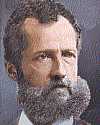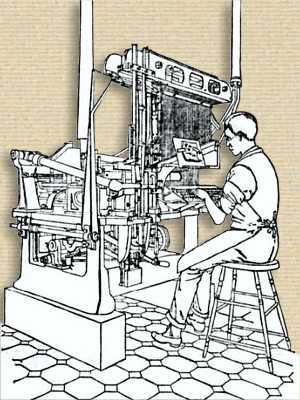 (source)
(source)
|
Ottmar Mergenthaler
(11 May 1854 - 28 Oct 1899)
German-American inventor who invented the Linotype machine which revolutionized typesetting, enabling one operator at a keyboard to do the work of three men setting moveable type. The machine cast each line as a bar.
|
MR. MERGENTHALER’S SPEECH.
Washington, D.C. (Feb 1885)
[p.19] Allow me, gentlemen, to express my hearty thanks to you for the honor you have bestowed upon me in coming here to witness the performance of my invention. You have come here to witness the operation of a new composing machine, and in as far as we are working in a field which is strewn with the wrecks and failures of former efforts in the same direction you will probably ask, "Are you going to have more success than those who have gone over that field before you; and if so, why? ” My answer is, "Yes, we are going to have full success for the reason that we have attacked the problem in an entirely different way than did those who have failed.”
[p.20] When I started on this problem I surveyed the field and selected the best road, regardless of the roads which others have taken. I knew the direction in which others had attempted to solve the problem, and was careful not to fall into the same rut which had led every previous effort into failure and ruin. We make and justify the type as we go along, and are thereby relieved from handling the millions of little tiny types, which have proved so troublesome to my predecessors who have failed. We have no distribution, yet we have a new type for every issue of a paper, an advantage which can hardly be overrated.
I am convinced, gentlemen, that unless some method of printing can be designed which requires no type at all, the method embodied in our invention will be the one used in the future; not alone because it is cheaper, but mainly because it is destined to secure superior quality.
The history of our enterprise, gentlemen, is one of evolution. We started by printing one letter at a time and justifying the sentences afterwards; then we impressed into papier maché one-word at a time, justified it, and made a type from it by after process. Next we impressed a whole line and justified it, still leaving the production of the type as a second operation; but now we compose a line, justify and cast it all in one machine and by one operator.
It is a great result, but, gentlemen of the Board, to you it is due as much as to me. You have furnished the money, I only the ideas; and in thus enabling me to carry this invention to a successful end you have honored yourselves and your country. I say you have honored your country, for every one will know that this invention has been originated in the land which gave birth to the telegraph, the telephone, the Hoe press and the reaper; everybody will know that it came from the United States, though comparatively few will know the name of the inventor. Gentlemen, again I thank you. The speech was received with flattering applause, followed by general congratulations and hand-shaking with the inventor.
- Science Quotes by Ottmar Mergenthaler.
- 11 May - short biography, births, deaths and events on date of Mergenthaler's birth.
- The Linotype - Manufacturer and Builder Magazine Article (Jun 1889) - Frontispiece
- Full article on 'The Linotype' - Manufacturer and Builder Magazine (Jun 1889)
- Today in Science History short event description for first Linotype machine put in service on 1 Jul 1886.
- The Biography of Ottmar Mergenthaler, Inventor of the Linotype, by Carl Schlesinger (ed.). - book suggestion.





